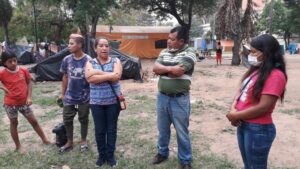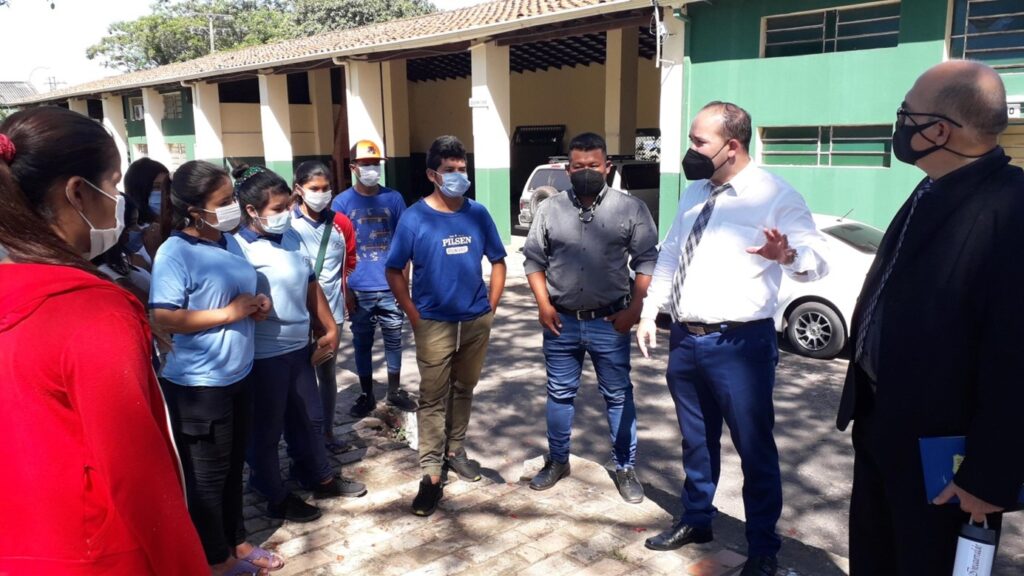Indigenous Rights Education in Paraguay
The Christian Church (Disciples of Christ) in Paraguay has been very active in the accompaniment and solidarity with the indigenous peoples, particularly in the Chaco Area. Part of that accompaniment consists in providing orientation to those communities of their rights and dignity by using legal mecanisms to provide for their well-being. As the Paraguayan Government approved recently a protocol of work with indigenous people, the Church accompanied two communities of Kokuere Guasu and Tuna Arroyo Guasu through that process. The Church was present in the signing of an agreement of Consultation and Free, Prior and Informed Consent between the Government and the recognized leaders of those communities before the Paraguayan Institute of the Indigenous People (INDI). The agreement establishes that every administrative action as well as any policy dictated by the Legislative and Executive branches of Government that could affect the land ownership or the well-being of indigenous communities should be consulted and consented by them before becoming the law of the land. Such Consent is not limited to legislation itself but also to each activity that is planned jointly with them as well as the development of those communities according to their cultures and ways of living. Friendship Mission, one of the ministries of the Church and longstanding Partner of Global Ministries, developed a work with its legal team, to provide orientation to indigenous communities on how to navigate in the constitutional and legal system for the benefit of fulfilling their rights.
The Reverend Cristóbal Mareco, Friendship Mission´s Executive Director, shared with me the work they are doing:

We have developed two programs, one that develops the knowledge and application of indigenous rights in Parraguay through popular education within the framework of citizenship training; the other that responds to sheep farming through theoretical-practical training in the framework of food safety. In that sense, we have hired the professional services of a lawyer, a veterinarian and a facilitator. We cannot fail to mention the outstanding initiative of Vicente Fernández, one of the leaders of the communities, who obtained copies of the National Constitution for all of the members of the community. The pedagogy of the professionals was experiential (theoretical and practical), the contribution of the facilitator was to put the lessons learned in a playful and artistic language, he resorted to group dynamics (puppets, games and challenges – resolution of problems), strengthening the concepts of solidarity, cooperation and organizational consolidation. At this moment, we have managed to carry out 32 training meetings: 18 training meetings on Indigenous Rights, and 14 training meetings on sheep farming. Part of the experience also included a travel from the communities in El Chaco area to Asunción, capital city of Paraguay, to meet with the leaders of INDI and INDERT (National Institute for the Land and Rural Development, public entity that regulates the possession of the land).
Pastor Mareco, then, shared with me a story that one of the indigenous women wrote to share with her own community after she returned from her travel to Asunción:
“Che rera (my name is) Lucila Fernández González, I live in the Kokuere Guasu community, Tava’i district, Caazapá department, Paraguay. I am a student of the Constitution of the Republic of Paraguay, 1992. I always wanted to learn more about human rights and to defend indigenous people. I am 20 years old. One day, Professor Bernardo (Izurralde, Friendship Mission´s lawyer) and the Pastor (Cristóbal Mareco, Executive Director of the Friendship Mission) announced that we would visit Asunción. We prepared ourselves and went to Asunción. We got ready and left Kokuere Guasu at 5 AM and arrived at 6:59 AM in Tava’i, at seven we took the bus, and eight hours later we arrived at the Asunción Terminal. We were 11 students, 1 cook and the leader, Pánfilo Fernández, as a companion.
When we arrived at the terminal, we found the Pastor and his son Facundo, who accompanied us from the terminal to the Friendship Mission. The Pastor and his son made me very happy with the welcome they gave us. That day we also shared with the people of the (Christian) Church (Disciples of Christ in Pinozá, Asunción). The people we met were very good and kind.
(On) Monday morning we went to the INDI. Then we moved to the INDERT (National Institute for the Land and Rural Development, public entity that regulates the possession of the land). There, an official received us. He told us about the work of the Institution. We learned and made questions. Then we went to lunch in the dining room. The meals were delicious. That afternoon we rested at Friendship Mission. While the rest of the delegation was resting, I went to visit an uncle who was in the trauma hospital. And (on) Tuesday morning we went to the Legislative Palace, but before we shared a meeting of landless peasants, they spoke in favor of the original peoples. That made me very happy. Hopefully they achieve their mission because there are many indigenous and landless peasants who suffer in the streets.
Asunción is a beautiful city, but I don’t want to stay because I can’t stand the heat of the sun, I feel sorry for the hot sun but sorrier for the poor indigenous people who are suffering on the streets. We are preparing ourselves to overcome those situations.
I am thankful for Friendship Mission, and for the Pastor, for being with us.”

